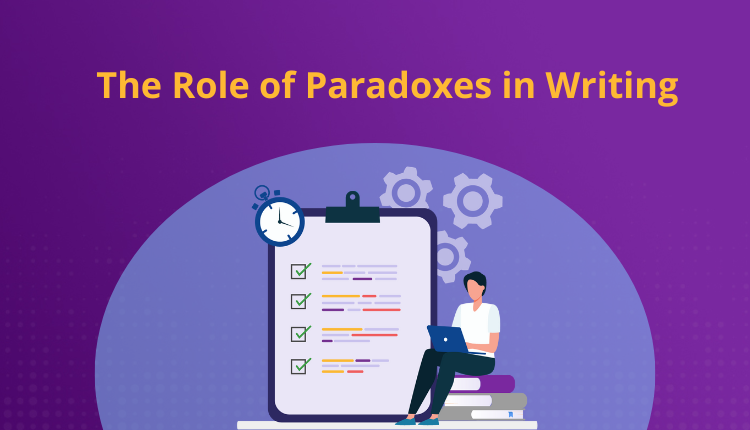Introduction
A paradox baffles the mind with its self-contradictory essence, yet it holds undeniable truth beneath its surface. Phrases like “Less is more” or “The more you learn, the less you understand” captivate readers by adding depth and challenging conventional thinking. From ancient philosophers to modern writers, paradoxes have been used to shift perspectives and enrich narratives.
Understanding paradoxes is not just a mental exercise—it’s a valuable storytelling tool. Free tools from Trinka.ai, such as the Paraphrasing tool, AI Content Detector, and plagiarism checker, can help writers present complex ideas more clearly and effectively.
What Is a Paradox?
At its core, a “paradox” is a statement or concept that appears absurd or contradictory but reveals deeper wisdom upon reflection. These aren’t just mind-teasers, they expand perspectives and urge readers to move past surface-level thinking to grasp the complexities of a narrative or idea.
For example:
Paradoxical Insight: “This is the beginning of the end.”
This phrase seems illogical at first, how can something begin and end simultaneously? However, it reflects a deeper reality: certain transitions mark the unavoidable progression toward an eventual conclusion. Paradoxes like this enrich both academic and creative writing. Paradoxes inhabit many writing styles, from technical research papers and persuasive essays to poetic reflections.
Why Use Paradoxes in Writing?
1. To Engage Readers’ Intellect: A well-placed paradox intrigues the reader. It invites intellectual engagement, compelling one to unravel its nuanced meaning. Paradoxes, therefore, ensure that the content resonates emotionally and intellectually.
2. To Explore Complex Concepts: Some ideas are too intricate for straightforward explanations. Paradoxes distill such complexities into concise statements, conveying information in an impactful way. For instance, scientific debates about duality, where phenomena are both waves and particles are effectively explained through paradox.
3. To Infuse Literary Elegance: Philosophy and literature thrive on paradoxes. Socrates, arguably the father of philosophical paradox, famously stated, “I know that I know nothing,” highlighting the essential humility required in the quest for knowledge. Paradoxes are not just elements of literary beauty they also serve as rhetorical tools in writing academic and practical texts.
Types of Paradoxes in Writing
1. Logical Paradoxes:
Logical paradoxes test foundational principles of thinking
Example: “This statement is false.”
This creates a logical loop, if it’s true, it must be false and vice versa.
2. Literary Paradoxes:
These enhance writing artistry by exploring emotions and themes
Example: Shakespeare’s “Julius Caesar” (Act III): “Cowards die many times before their deaths.” This highlights the emotional reality of fear and its symbolic “deaths.”
3. Situational Paradoxes: Situational paradoxes surprise readers by juxtaposing contradictory outcomes
Example: The Jevons paradox illustrates how increased efficiency in technology leads to higher resource usage.
4. Rhetorical Paradoxes: Often deployed for persuasive arguments, these paradoxes challenge conventional thinking
Example in Argumentative Texts:
“To protect freedom, we impose restrictions.”
This statement underscores societal trade-offs between liberties and regulations.
Famous Examples of Paradoxes in Literature
Paradoxes aren’t limited to technical discourse; they’re a literary staple. Here are notable examples:
1. William Shakespeare – “The more one loves, the more he loses.” illustrates the paradox of love and sacrifice.
2. George Orwell – Orwell’s “1984” masterfully utilizes paradoxes like “War is peace” and “Ignorance is strength” to critique totalitarian ideologies.
3. F. Scott Fitzgerald – In “The Great Gatsby”, paradox unravels the protagonist’s simultaneous pursuit and loss of happiness—highlighting the contradictions of the American Dream.
4. Scientific Writings – Schrödinger’s cat, a famous paradox in quantum mechanics, forces readers to grasp counterintuitive concepts of probability and reality.
Using Paradoxes in Your Writing: A Strategy Guide
1. Start with a Clear Context: Ensure the audience has enough information before introducing the paradox. For example, when discussing sustainability, clarify basic concepts before explaining the Jevons paradox.
2. Use Where Contradictions Add Value: Paradoxes work best when discussing ethical dilemmas, societal trade-offs, or scientific uncertainties.
Example: “Enhancing AI intelligence may reduce bias but also amplify structural inequalities.”
3. Stimulate Conversation: A paradox can fuel debates and drive home key themes. For example, blogging about productivity might end with, “To do less is sometimes to achieve more,” provoking discussion.
4. Avoid Overuse: Moderation is key. Excessive paradoxes might overwhelm or confuse the audience. Use them sparingly to emphasize key ideas.
Ensure your paradoxes hit the mark with Trinka’s editor, a tool that enhances clarity and balances creativity with professional standards.
Practical Applications for Academic and Business Writing
In Research: When tackling enigmas, paradoxes highlight discussions. Schrödinger’s paradox, for example, offers a springboard for exploring hypotheses in physics or logic.
In Business: Strategic paradoxes, like “Investing in innovation may reduce immediate profitability,” frame challenges in managerial reports while signaling innovation.
In Blogs: Paradoxes like, “The faster we move forward, the further behind we fall,” make memorable hooks when discussing modern dilemmas like technology or lifestyle.
Conclusion
Why Writers Should Embrace Paradoxes Mastering the art of paradox adds depth to writing, compelling readers to reflect and probe for hidden meanings. By blending intellectual engagement with nuanced truths, paradoxes keep narratives enriching and thought-provoking. Want to refine your writing while preserving creative flair? Trust Trinka.ai, your AI-powered solution for grammar, creativity, and consistency. Use free tools such as Paraphraser to enhance your writing experience. Whether crafting paradoxical arguments or publishing polished prose, Trinka is your digital ally.

